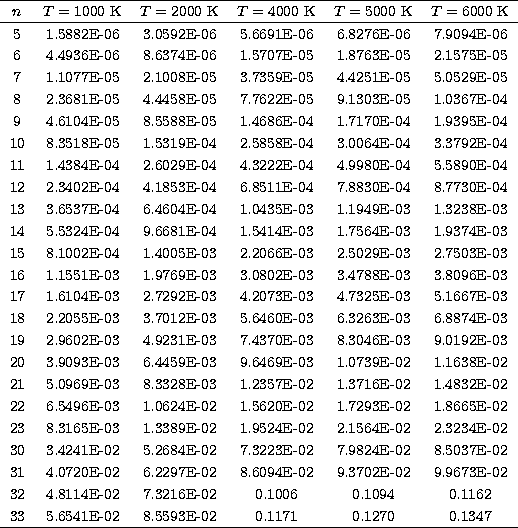 |
The IR and SMM lineschapes are needed for interpretation of the observed
solar lines in the infrared and submillimetric spectrum. The present work
deals with the
densities below the Inglis-Teller limit, above which line
dissolution is important. The common semiclassical method is problematic
since it overestimates the line widths at low densities and requires an
improvement. The collision rate method is an alternative method for linewidth
calculations in such cases, particularly for the electron case. Within the
impact or quasistatic approximation for ions, the profile can be easily
obtained as soon as the electronic and/or the ionic linewidth is calculated.
For this purpose electron-Hydrogen atom transition rates are
provided in Tables 4 to 6.
The spectral line broadening of the lower Rydberg lines is a more complex
problem when the electron density becomes greater than the Inglis-Teller
limit ![]() The description of a system with one or many perturbers in
the Rydberg atom must be considered. Line dissolution has to be treated
conveniently. In any case, even at average densities, there is always a
critical electric microfield
The description of a system with one or many perturbers in
the Rydberg atom must be considered. Line dissolution has to be treated
conveniently. In any case, even at average densities, there is always a
critical electric microfield ![]() - in the integration over the microfield
distribution - above which, line dissolution appears (Seaton 1990).
Between the impact and static approximation for ions, an intermediate
region between these two approximations is expected, for which neither
of the limiting approximations are valid, thus calling for an improved
modelisation.
- in the integration over the microfield
distribution - above which, line dissolution appears (Seaton 1990).
Between the impact and static approximation for ions, an intermediate
region between these two approximations is expected, for which neither
of the limiting approximations are valid, thus calling for an improved
modelisation.
The authors would like to acknowledge Pr. H.R. Griem for fruitful suggestions on the original manuscript.
Copyright The European Southern Observatory (ESO)